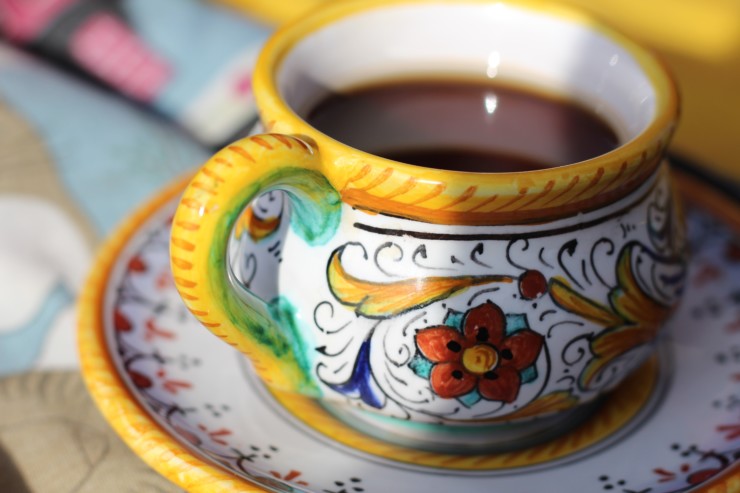
Humanity happens.
That’s why I almost didn’t write to you today. It’s also why we made our own “coffee shop” down by the Hudson River this afternoon, where the sun was warm enough to keep the 53-degree chill at bay.
Making a coffee shop is easier than you think, especially if your standards for imbibing don’t include coffee. We brought Ceylon tea, with a touch of cardamom. And tea sandwiches of an experimental nature.
The dandelions are just poking up out of the ground here in New York, where the new deal is social distancing, to keep the coronavirus from overtaking whole communities. College was closed. So, we made our own popup coffee shop down by the river. As for the dandelion leaves, we used them in our tea sandwiches, which also had a generous layer of fresh garlic, marinated in olive oil with red pepper flakes, made all the more healthy by a dash of oregano oil.
My daughter’s college is doing their own experiment—with virtual learning. By 6 pm Friday, she will know what the rest of the semester holds. Of course she doesn’t want to spend the next few months studying from home. That’s not what she signed up for.
But then, none of us sign up for what our fragile humanity sometimes hands us.
At the river today, we drank our Ceylon, ate our tea sandwiches, and then had whole-wheat lemon cookies we’d made last night, knowing we’d be going to the river this afternoon. Or hoping we’d be going. We did.
There was a little boy who came up onto the gazebo stage where we’d made our coffee shop. He sang like there was no such thing as fragility in the world. He cut a few dance moves that left us chuckling. When he was finished with his show, we clapped heartily as he stepped down the stairs to go on his way with his mom. Then we read a few poems from Earth to Poetry and Where the Sidewalk Ends. We decided that Shel Silverstein has a side to him that sees deeper than you might think. Sees the humanity. Sees the fragility.
When life feels fragile, it is good to have a sense of connection beyond your immediate circumstances. One way we provide this in our Every Day Poems deliveries is to occasionally include classic poems. Recently, we sent “The Red Wheel Barrow” to subscribers. You might think “The Red Wheel Barrow” has nothing new to say to us. You might be right. That is okay.
Tonight, as I type, I am sitting in my grain-gold living room, with its old red-oak floors, French doors to my left that open to the dining room, and dark wood trim everywhere. In the corner is a secretary I bought this summer. I’d been needing some kind of storage furniture for a very long time, and I’d been saving towards a new piece that I’d seen in a catalog. But then I thought about it: why not get something with a history instead? So I went to Melita’s and found a reasonably-priced piece that she’d rescued from Portugal and refurbished. I don’t know what kind of wood it is. She didn’t either. But it’s beautiful. And the lock in the doors at the bottom is from London, long ago.
I love the feeling of comfort that old wood seems to give. There’s a simplicity to it that’s also quite rich. Like “The Red Wheel Barrow.”
This poem was written by William Carlos Williams, who was a physician. He must have encountered the fragility of life every single day. And he met that fragility with a poem like this one, which gives us what feels like an image frozen in time—yet timeless, infinite. The red, the white, they are life colors. One that rushes in, the other that fades out. In their way, the colors alone in this poem have a sense of being parts of a whole that keeps shifting. Like the cycles of life.
My eldest daughter volunteered at a farm last year, and she was often transporting things in wheel barrows and carts, especially over to the chickens, who eagerly waited for the vegetable scraps she might be sharing. When she wasn’t pushing wheel barrows or pulling carts, sometimes she was gathering eggs. It was a virtuous circle where, in essence, she and the chickens gave to each other. “The Red Wheel Barrow” contains this virtuous circle without saying a thing about it. The “glazed with rain water” status of the barrow only adds to the sense of circularity and cycles. Without rain there is no life. And the rain itself is part of a cycle.
In another poem we ran recently, Ezra Pound says to Walt Whitman, “We have one sap and one root—”. He says this after admitting that he did not originally see the way he and Whitman were connected. Maybe Pound had come across some fragility of his own, since he’d finally become “old enough.” And, through that experience, perhaps he could see how poetic history connected them.
Running classic poems in Every Day Poems is our way of connecting readers to the rich past of poetry. It’s a past we can turn to when we feel our fragility. It connects us through time, with others who’ve gone before us, walked in the rain that now glazes our windows on stormy days.
Poetry Prompt
Start your poem with the now-classic opening “So much depends upon…” Make your poem simple and image-rich.
Do You Have Kindle Unlimited?
Right now, if you have Kindle Unlimited, you can read Earth to Poetry for free. Or, you can take advantage of the National Poetry Month/Poetic Earth Month sale and pick up a digital copy for $2.99 on Kindle.
Get Earth to Poetry and get poetically inspired!
- Poetry Prompt: In the Wild Secret Place - January 6, 2025
- Journeys: What We Hold in Common - November 4, 2024
- Poetry Prompt: My Poem is an Oasis - August 26, 2024
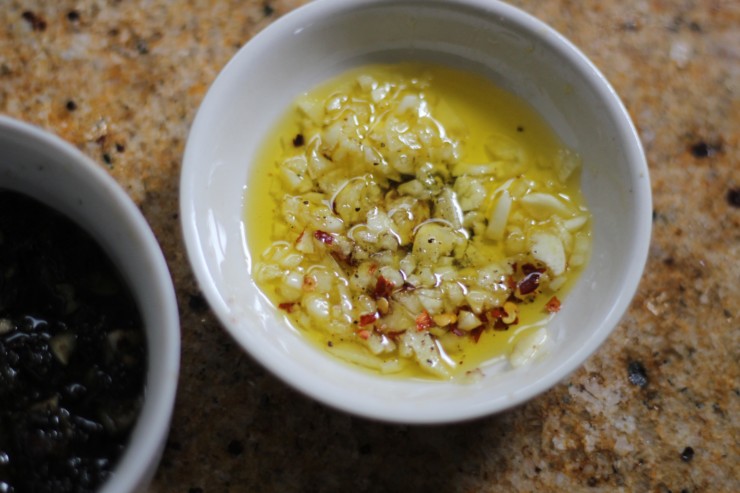
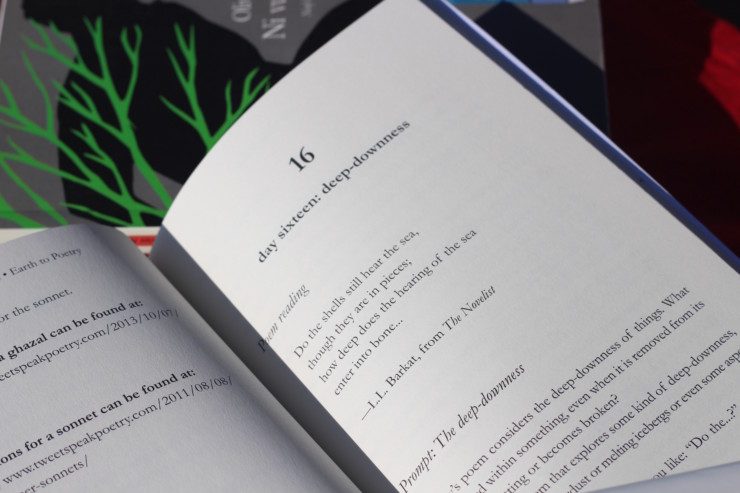
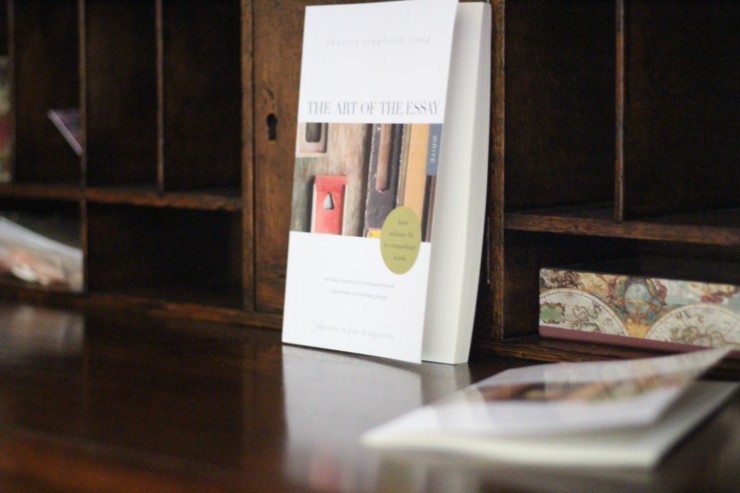

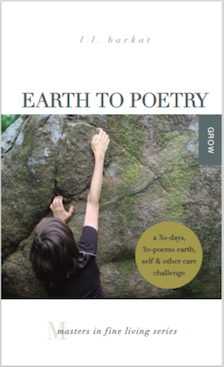
Maureen says
Each time you describe anything about your house, I sigh, as that house must be such a beauty.
With much closed down here in the D.C. area, I turn to poetry.
Way back in May 2015 I wrote this:
Love
after William Carlos Williams*
so much depends
upon
red roses, chocolate
kisses
the children waiting
up
your one night
off.
* ‘The Red Wheelbarrow’
L.L. Barkat says
Aw. 🙂 Thank you, Maureen. 🙂 It’s a tiny little house that was built during the Great Depression by someone who must have really, really cared about making something strong and beautiful and well-crafted. (A house that’s like a good poem! 🙂 )
I love your “Love” poem.
And I’m happy to do poetry with you, always, but especially during this fragile, isolating time. Poetry connects.
PAULA WELLS says
Gratitude for all who want to remain so humanly connected at this time:
What we leave behind (with a nod to William Carlos Williams)
So much depends on
the lingering I love you at the end of a phone call,
the zinnia plucked on our hurried way out of the house
and left in our neighbor’s mailbox,
the knitted brow of disapproval
at a hand extended in a pandemic.
L.L. Barkat says
There are ways to connect, yes. I do love your “zinnia plucked.”
Also, I’ve been thinking that it’s a time when we can connect with the beauty of the outdoors, which we often forget to do. It would boost our contentment, too.
Richard Maxson says
Kitchen
So much depends upon
this kitchen
the wrought iron
of the cup rack,
first choice
of emerging day,
the swirl of cream
against vanishing darkness
this cool spring morning
where I recall a poem
as I gaze
at the cradled eggs
Bethany R. says
“It’s a past we can turn to when we feel our fragility. It connects us through time, with others who’ve gone before us, walked in the rain that now glazes our windows on stormy days.” Beautifully said and comforting.
Wishing you and all the readers and writers in the Tweetspeak Community well. 🙂 Nice to have this little gathering place that is safe and sound for any to visit and “sip coffee” together. 🙂
Jack Cooper says
Enjoyed the prompt “So much depends on…,” and the poems it inspired. Good work.
Megan Willome says
Thank you for this.
When William Carlos Williams’ poem came up at Every Day Poems the other day, I wrote this:
So much depends
upon
a pink house-
key
blackened with over-
use
into the brown
cabinet
Katie says
“Humanity happens.”
“But then, none of us sign up for what our fragile humanity sometimes hands us.”
“When life feels fragile, it is good to have a sense of connection beyond your immediate circumstances.”
Thank you for this post, L.L. Thank you for these classic poems that “connect us through time with those who have gone before us.”
So much depends on
the press conference
when the governor steps to the podium
will we learn schools will close?
churches will suspend services?
nursing homes refuse visitors?
Measures that seem so extreme
announcements of such drastic actions
yet the officials are stepping up
they are putting in place restrictions
that will slow the spread of contagion
and preserve lives.
lynn__ says
so much depends upon
the whistling tea kettle
polished stainless steel
on bisque enamel stove
next to bunch of
yellow ripe bananas and
the smell of freshly baked cookies
as warm afternoon sun
gazes into kitchen window.
Laura, thanks for your lovely prose, this poetry prompt, and a place to connect…God bless.
Lori DiGisi says
So much depends
upon
a small child
dancing along the riverbank
song from sweet lips
green from a lollipop
free from care
as tousled locks
blow
in the wind
Laura Brown says
so much depends
upon
an orange paring
knife
flecked with almond
dust
beside the morning
oats.
—
so much depends
upon
the yellow leaves
of blossoms
of my friend’s
forsythia
above the muddy
yard.